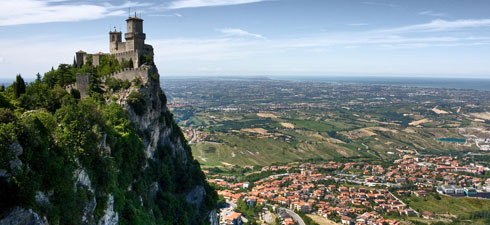A tax haven is dying, as the first autumnal mists descend on the Republic of San Marino, blotting out even La Rocca, its centuries-old fortress. The latest eviction order arrived last week when the Bank of Italy put an administrator at the helm of the Rimini bank that controls Credito Industriale Sammarinese, one of the republic’s 12 banks. The inspectors from via Nazionale [seat of the Italian national bank] cite blatant violations of laws against money-laundering.
San Marino was once a wellspring of emigrants. The boom hit the Italian Riviera in the 1960s with the advent of tourism, vigorous trade and then industry. The newfound prosperity brought with it the first tax dodgers: hotel keepers and merchants from Emilia-Romagna squirreling their takings away in San Marino…till the little republic went overboard in the 1990s. Alongside the four traditional banks, there are 59 financial institutions and another eight banking establishments focused on collecting and investing funds, while providing very little in the way of financial services.
In a word, a veritable Shangri-la transit station for filthy lucre – and not only from Italy: 9 out of 10 euros kept here comes from abroad. The Russians eventually turned up to do wholesale business, and organised crime has been digging its heels in here in this offshore enclave. Hence the spate of recent financial scandals, including that of the Delta Group – controlled by the glorious Cassa di Risparmio, an Italian bank founded in the late 19th century on peasants and workers’ savings, which has gradually morphed into Italy’s own graft central.
”They’re out to bring us down"
But then the global economic tsunami hit: the tax havens were called on the carpet, blacklisted by the OECD and embargoed by the Italian government. “So those days are gone now: San Marino had taken it too far,” admits secretary of industry and trade Marco Arzilli. Thecurrent government, a Christian democratic coalition in power since 2008 and lately on the wane, is doing its best to rid the country of its label as a tax fraud capital. “When we took office, the state was under intense scrutiny bymoneyval and grey-listed by the OECD. We’ve done a tremendous amount in the space of two years,” vaunts foreign secretary Antonella Mularoni. “We’ve abolished the anonymous offshore companies and banking secrecy, conformed to international standards of banking transparency, and closed down a number of phoney operations. And we were prepared to sign two agreements: one on cooperation between the Italian police and ours, and one authorising Bankitalia inspectors to enter our republic’s institutions. Only, the Italian government is playing deaf.” As is the IMF in Washington DC. “That attitude is incomprehensible,” says Mularoni.
One thing is for sure: San Marino’s bankers are all beating a hasty retreat and keeping a very low profile. Last year’s cash flow situation was devastating: cash holdings shrank 35%, according to the central bank. Tax evaders no longer trust in Mount Titano [the mountain on which San Marino is built], and the tax amnesties [voted in Rome] have drained the bank vaults, pulling almost €6 billion out of the €14 billion previously deposited in San Marino banks. And in the meantime, the crisis has spread to every sector, reducing hiring and liquidity at institutions that have no access to the interbank market.
As if that weren’t enough, a colossus like UniCredit now wants to sever its venerable ties to the Banca Agricola e Commerciale. ”They’re out to bring us down," complains Marco Beccari, secretary-general of the Democratic Confederation of San Marino Workers. “Of course those who acted dishonestly have wrecked our image, but underneath it all there’s a healthy economy that ought to be preserved. 31,000 inhabitants, 20,000 workers, 6,500 of whom are from Emilia-Romagna.” 4,000 civil servants and 15,000 private-sector employees – in trade and the engineering, steelworking, pharmaceutical and ceramics industries – work in the industrial zones near the border of San Marino.
Only hope left is the Northern League
This whole microcosm, which remained intact for years, is now writhing in the vicegrip of the Italian government. This year’s state deficit is expected to come to €80 million – and to double, at the very least, in 2011. Word has it the IMF might intervene with credit lines to keep the republic afloat, as it did for the likes of Greece and Argentina. “Some businesses have gone back to Italy, others won’t accept our invoices anymore: we’re treated like lepers,” bewails Beccali. The economic crisis has done the rest: 1% of the labour force lost their jobs last year. Unemployment benefits for 1,500 laid-off workers have gone through the roof, and illegal employment is on the rise.
The numbers may seem negligible, but they weigh heavily on the Adriatic idyll, which has always enjoyed a generous welfare state replete with pensions still based on pay levels, staff canteens offering €1.50 meals, good health insurance coverage, loans for homeowners and for daycare expenses. That whole system is now jeopardised by the Rome embargo and by a crumbling real estate market. Houses were built on every inch of Mount Titano – property being one of the preferred channels for laundering dirty money –; now a good 7,000 houses are deserted. “Our object is to save a healthy economy,” they explain at the chamber of commerce. “Otherwise everything will go up in smoke, even for Italian workers and companies in the area that live on orders from San Marino.”
The only hope left is theNorthern League, which has considerable support in the border regions. “They’re the only ones who might be able to reason with the Italian government,” they say in San Marino, recalling that the Italian economy minister, Giulio Tremonti, used to be an advisor to San Marino banks…
Translated from the Italian by Eric Rosencrantz











